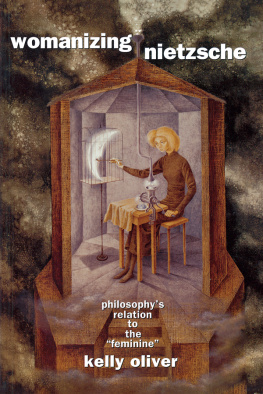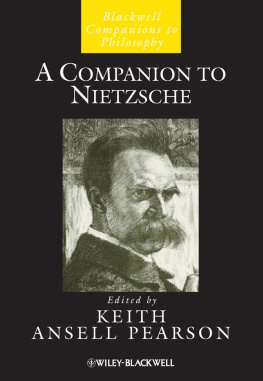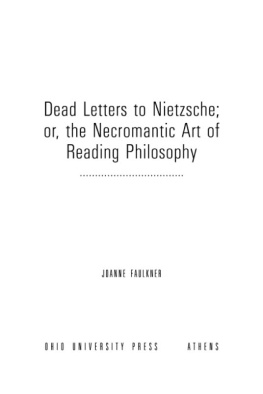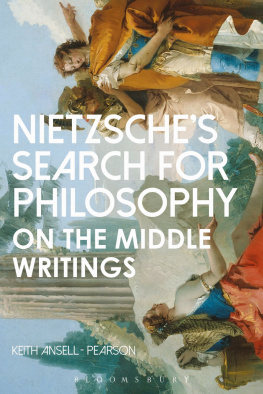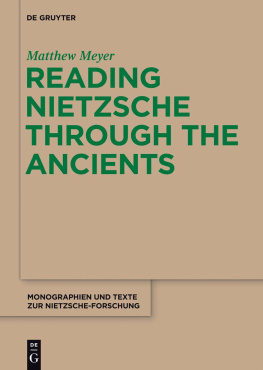WOMANIZING NIETZSCHE
Philosophys Relation to the Feminine
Womanizing
Nietzsche
Philosophys Relation to the Feminine
Kelly Oliver

First published 1995 by Focal Press
Published 2016 by Routledge
2 Park Square, Milton Park, Abingdon, Oxon OX14 4RN
711 Third Avenue, New York, NY 10017
Routledge is an imprint of the Taylor & Francis Group, an informa business
Copyright 1995 by Routledge
All rights reserved. No part of this book may be reprinted or reproduced or utilised in any form or by any electronic, mechanical, or other means, now known or hereafter invented, including photocopying and recording, or in any information storage or retrieval system, without permission in writing from the publishers.
Notices
Practitioners and researchers must always rely on their own experience and knowledge in evaluating and using any information, methods, compounds, or experiments described herein. In using such information or methods they should be mindful of their own safety and the safety of others, including parties for whom they have a professional responsibility.
Product or corporate names may be trademarks or registered trademarks, and are used only for identification and explanation without intent to infringe.
LIBRARY OF CONGRESS CATALOGING-IN-PUBLICATION DATA
Oliver, Kelly, 1959
Womanizing Nietzsche: philosophys relation to the feminine /
Kelly Oliver.
p. cm.
Includes bibliographical references and index.
ISNB-13: 978-0-415-90681-4 (hbk)
ISBN-13: 978-0-415-90682-1 (pbk)
1. Derrida, JacquesContributions in philosophy of woman. 2. Nietzsche,
Friedrich Wilhelm, 18441900Contributions in philosophy of woman. 3.
Woman (Philosophy)History. 4. Feminist theory. I. Title.
B2430.D484055 1995
305.4201dc20
94-25602
CIP
for Virginia, my mother
CONTENTS
Many contemporary debates over Nietzsche and Derrida focus on the politics, or the impossibility of politics, spawned by their theories. Various critics continue to argue that Nietzsche and/or Derrida make it impossible to talk about any positive politics or strategies for change. Some of these critics have claimed that Nietzsche and/or Derrida leave us with a radical relativism that makes it impossible to choose one strategy, method, or politics over another. Some of these critics also worry that Nietzsche and Derrida have challenged not only the object of our choice, but also the subject who chooses; the deconstruction of the subject makes it impossible to talk about political or ethical agency. While I think that the possibility of agency is an important issue, in Womanizing Nietzsche I will not enter the debate from this angle. I do not accept the criticisms of deconstruction that make it out to be some form of nihilism which abolishes strategy, method, politics, ethics, choice, the subject and truth. Neither Nietzsche nor Derrida, even while deconstructing these notions, denies the existence of politics, ethics, the subject and truth. For both Nietzsche and Derrida these concepts need to be constantly reevaluated. Woven throughout the fabric of Womanizing Nietzsche are readings of texts in which both Nietzsche and Derrida attempt to articulate the possibility of change for the better.
Some of Derridas critics have latched onto the phrase Il ny a pas de hors-texte (there is nothing outside of the text) and used it to prove that Derrida is a linguistic fatalist who does not believe in the world (OG 158). A careful reading of Derrida, however, makes it difficult to defend this position. As Derrida says in an interview: [i]t is totally false to suggest that deconstruction is a suspension of reference. Deconstruction is always deeply concerned with the other of language. I never cease to be surprised by critics who see my work as a declaration that there is nothing beyond language, that we are imprisoned in language; it is, in fact, saying the exact opposite (RK 123, see also P 64). I read Nietzsche and/or Derrida neither as nihilists who attempt to destroy rather than create, nor as fatalists who cannot imagine any possibility of change for the better. I read Nietzsche and Derrida as visionaries who glimpse something beyond the traditional subject-centered metaphysics and use nontraditional methods to open traditional philosophy onto this beyond. They try to open the discourse to other voices, multiple voices. As Derrida says,Deconstruction is not an enclosure in nothingness, but an openness towards the other (RK 124).
Although I do not accept many of the standard criticisms of Derrida, I am not an apologist for deconstruction. For Derrida, deconstruction is not neutral; it intervenes in the polis (FL 8; P 93). Like all theory, however, it does so at the double risk of consolidating the very values that it attempts to displace on the one hand, and setting up new values within the same hierarchical binary structure of the old values, on the other hand (EM 135). These risks of co-optation and consolidation are risks that Derrida insists must be taken (P 69). At the same time every text must be called to account for the ways in which it is complicit with the values that it attempts to overturn. This is the kind of diagnosis that I am attempting in Womanizing Nietzsche. I insist on reassessing the implicit values, and effects, of Derridas texts in spite of the explicit project of those texts.
In the same way, I indicate some of the ways in which Nietzsches texts are complicit with the values that he attempts to undermine. Nietzsches attempts to open philosophical discourse onto its other are the most powerful in the history of philosophy. More than any other writer, Nietzsches revolutionary ideas and words have permeated my thinking about subjectivity, ethics, truth and alterity. Nietzsches texts open up the possibility of imagining doing philosophy otherwise. In On the Genealogy of Morals, for example, he sets out an alternative to the Hegelian lordship/bondage relation in which all value is determined in opposition to a hostile outside world; he suggests a way of valuing that is not hostile to everything different from itself, but is tolerant of difference (OGM 3637). Even while engaging (in) the discourse of philosophy, Nietzsche playfully calls that discourse into question. It is in this Nietzschean spirit, using some Derridean reading strategies, that I continue this task of calling on philosophy to account for its values.
My criticism is not the external criticism that there is no positive politics in the writings of Nietzsche or Derrida. My criticism is the internal criticism that both Nietzsche and Derrida, even while opening philosophy onto other voices, prevent the possibility of a feminine voice. Moreover, I argue that their strategies for opening philosophy onto its other(s) are often dependent on the preclusion of a feminine other. So even their various shifts from a philosophy of the subject to a philosophy of the other are constructed through the sacrifice of the feminine other, especially the feminine mother.
Following Helene Cixous, Alice Jardine, and others, Rosi Braidotti argues that certain forms of post-Hegelian philosophy (though not all), victims of an unprecedented crisis of legitimation, resort, as the only way out, to a redefinition of the feminine, or of the becoming-woman(PD 9). I agree with this diagnosis of philosophys need to try to become woman in order to avoid the crisis of the Enlightenment subject, man. I will not only diagnose philosophys desire to become woman, but also philosophys success at opening itself onto the feminine. My analysis centers on Derridas association of Nietzsche with woman in
Next page
